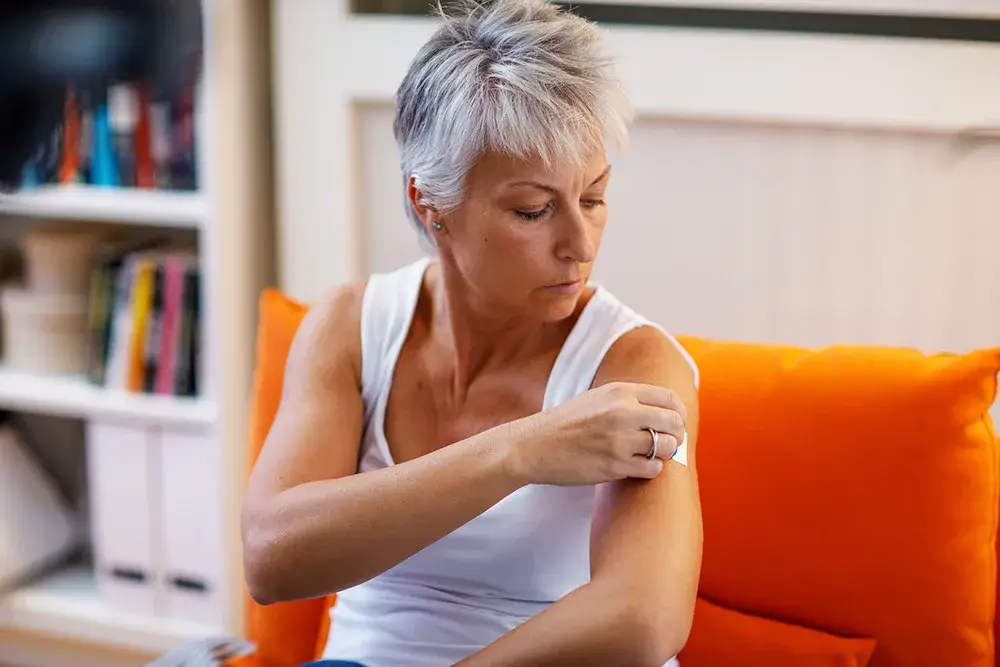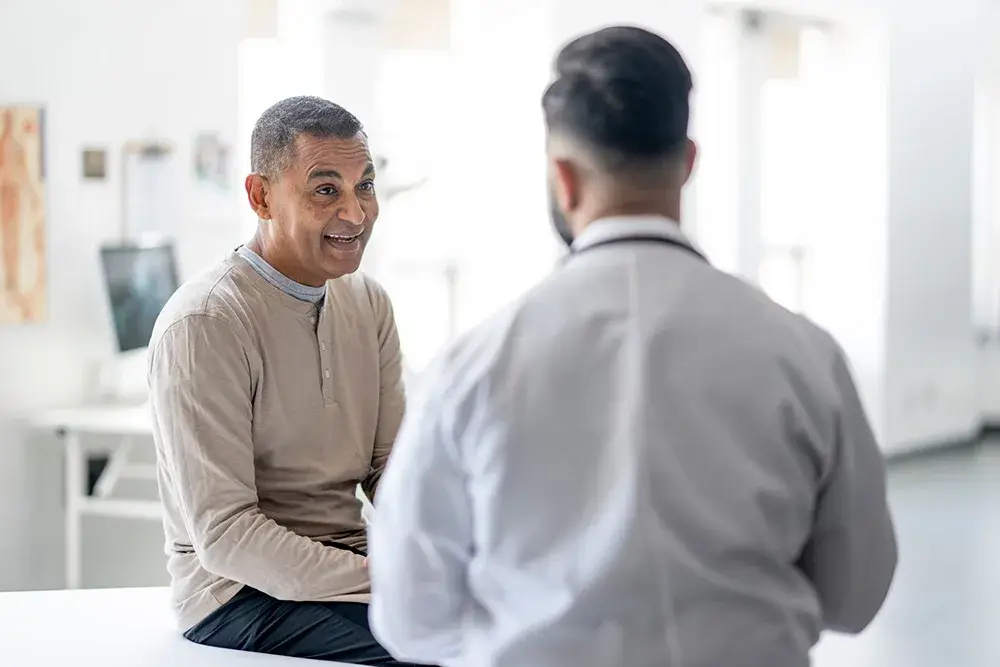Hormone Replacement Therapy, also known as HRT, can be a life-changing treatment for men suffering from low testosterone and for women experiencing menopause. By balancing and optimizing hormones for each patient, we see a quality of life increase that can include having more energy, less negative symptoms like weight gain or low libido, and less hot flashes related to menopause in women.
However, before you begin a hormone replacement therapy treatment plan you should ask your doctor and yourself a few key questions in order to set expectations accordingly.
What to expect when you first start taking HRT for men suffering from Low T?
For men with low testosterone (Low T), hormone replacement therapy can help restore testosterone levels to a healthier range and alleviate symptoms associated with low testosterone. Here’s what you can typically expect from HRT for men with low testosterone:
Increased Energy Levels: One of the most noticeable effects of testosterone replacement therapy is often increased energy levels and a reduction in fatigue.
Improved Mood: Testosterone plays a role in mood regulation, so many men report feeling happier and more emotionally stable after starting HRT.
Increased Libido: Testosterone is a key hormone for sexual function, so HRT often leads to an increase in libido and improved sexual function.
Muscle Mass and Strength: Testosterone is an anabolic hormone, meaning it promotes muscle growth and strength. Men with low testosterone may experience gains in muscle mass and strength with HRT, especially when combined with regular exercise.
Fat Loss: Testosterone helps regulate fat metabolism, so HRT can lead to a reduction in body fat, particularly around the abdomen.
Improved Cognitive Function: Some studies suggest that testosterone may play a role in cognitive function, including memory and concentration. Men with low testosterone may experience improvements in these areas with HRT.
Bone Health: Testosterone is important for maintaining bone density, so HRT can help prevent osteoporosis and reduce the risk of fractures in men with low testosterone.
Improved Sleep Quality: Testosterone levels tend to peak during sleep, and low testosterone levels can disrupt sleep patterns. HRT may improve sleep quality and help alleviate sleep disturbances associated with low testosterone.
Hair Growth: Testosterone is involved in the regulation of hair growth, so some men may experience increased facial and body hair growth with HRT.
Mild Side Effects: While uncommon, some men may experience mild side effects from testosterone replacement therapy, such as acne, fluid retention, or breast tenderness. These side effects are usually temporary and can often be managed by adjusting the dosage or treatment regimen.
TRT CLINIC
Learn more about our life-changing testosterone therapy program for men.

What to expect from HRT for women suffering from menopausal symptoms?
Hormone replacement therapy for women suffering from menopause can help alleviate symptoms associated with declining hormone levels. Here’s what you can typically expect from HRT for menopausal women:
Relief from Hot Flashes and Night Sweats
Estrogen therapy, often combined with progestin in women who still have their uterus, can help reduce the frequency and severity of hot flashes and night sweats, two common symptoms of menopause.Improved Vaginal Health
Estrogen therapy can help alleviate vaginal dryness, itching, and discomfort, as well as reduce the risk of urinary tract infections and urinary incontinence by restoring moisture and elasticity to the vaginal tissues.Prevention of Bone Loss
Estrogen helps maintain bone density, so hormone replacement therapy can help prevent osteoporosis and reduce the risk of fractures in menopausal women.Maintenance of Skin Health
Estrogen contributes to skin elasticity and moisture, so HRT may help reduce dryness, wrinkles, and other signs of aging skin associated with declining estrogen levels.Improved Mood and Sleep
Hormone fluctuations during menopause can contribute to mood swings, irritability, anxiety, and sleep disturbances. Estrogen therapy may help stabilize mood and improve sleep quality.Prevention of Vaginal Atrophy
Estrogen therapy can help prevent vaginal atrophy, a condition characterized by thinning, drying, and inflammation of the vaginal tissues, which can lead to pain during intercourse and an increased risk of vaginal infections.Maintained Cognitive Function
Some studies suggest that estrogen therapy may help maintain cognitive function and reduce the risk of cognitive decline and dementia in menopausal women.Potential Relief from Menopausal Symptoms
While estrogen therapy is effective for relieving many menopausal symptoms, including hot flashes, night sweats, vaginal dryness, and mood swings, it may not be suitable for everyone. Some women may require additional treatments or alternative therapies to manage their symptoms effectively.Regular Monitoring and Follow-Up
Women receiving hormone replacement therapy should undergo regular monitoring and follow-up appointments with their healthcare provider to assess the effectiveness of treatment, adjust hormone doses if necessary, and monitor for any potential side effects or complications.

What is the average age to start HRT?
Testosterone replacement therapy (TRT) may be prescribed to any man with low testosterone levels which can occur at any age but is more common in men over 30. However, the average age for men to start TRT is typically around 40 to 50 years old.
For women experiencing symptoms of menopause, such as hot flashes, night sweats, vaginal dryness, and mood swings, hormone replacement therapy (HRT) with estrogen and/or progesterone may be recommended. The average age for menopause, when a woman’s menstrual periods stop, is around 51 years old. Of course, there are always outliers and every person is different.
How Long After Starting HRT Do You Feel a Difference?
Because everyone is different, the time it takes for hormone replacement therapy to cause a noticeable reduction in symptoms varies.
For Men:
The timeline for noticing changes after starting hormone replacement therapy (HRT) for men with low testosterone (Low T) can vary widely from person to person. However, many men begin to notice improvements in symptoms within a few weeks to a few months of starting treatment. Here’s a general timeline of what to expect:
Early Changes (Weeks 1-4):
Some men may start to notice early improvements in energy levels, mood, and libido within the first few weeks of starting testosterone replacement therapy (TRT).
Initial changes may include increased mental clarity, reduced fatigue, and a slight improvement in sexual function.
Intermediate Changes (Months 1-3):
By the first few months of treatment, many men experience more significant improvements in symptoms such as increased energy, enhanced mood stability, and a stronger libido.
Some men may also notice early changes in body composition, such as a reduction in body fat and an increase in muscle mass.
Improved sleep quality and cognitive function may also become more noticeable during this time.
Long-Term Changes (Months 3-6 and Beyond):
Over time, the effects of testosterone replacement therapy (TRT) tend to become more pronounced and may include further improvements in energy levels, mood, and sexual function.
Changes in body composition, such as increased muscle mass and strength and a decrease in body fat, continue to develop gradually over several months.
Bone density may also begin to improve, reducing the risk of osteoporosis and fractures in men with low testosterone.
Some men may experience changes in facial and body hair growth, as well as a deepening of the voice, although these changes typically occur more gradually and may take several months to become noticeable.
For Women:
Early Changes (Weeks 1-4):
Some women may start to notice early improvements in symptoms such as hot flashes, night sweats, and vaginal dryness within the first few weeks of starting estrogen therapy.
Relief from symptoms like vaginal dryness and itching may be among the first changes experienced, as estrogen helps restore moisture and elasticity to the vaginal tissues.
Intermediate Changes (Months 1-3):
By the first few months of treatment, many women experience more significant improvements in symptoms associated with menopause.
Hot flashes and night sweats may become less frequent and less severe, leading to improved sleep quality and overall well-being.
Vaginal dryness and discomfort may continue to improve, leading to increased comfort during sexual intercourse and a reduced risk of vaginal infections.
Mood swings, irritability, and other emotional symptoms may also start to stabilize, leading to a greater sense of emotional well-being.
Long-Term Changes (Months 3-6 and Beyond):
Over time, the effects of hormone replacement therapy (HRT) tend to become more pronounced and may include further improvements in menopausal symptoms.
Continued relief from hot flashes, night sweats, and vaginal dryness may be observed, with many women experiencing a significant reduction in these symptoms within three to six months of starting treatment.
Bone density may also begin to stabilize or improve, reducing the risk of osteoporosis and fractures associated with declining estrogen levels during menopause.
Some women may also notice improvements in skin health, including increased moisture and elasticity, as estrogen helps support collagen production and skin hydration.
It’s important to keep in mind that individual responses to testosterone replacement therapy can vary, and results also depend on the treatment delivery method (creams vs. injections, etc.). Usually, the most noticeable changes are in energy levels and mood, while the full physical benefits of treatment may take several months to be completely noticeable.

How long after starting HRT will I lose weight?
Weight loss is one of the many great benefits of balancing one’s hormones. In reality, though, the impact of HRT on weight loss can vary significantly from person to person, and it’s helpful to have realistic expectations regarding weight loss.
Weight loss is influenced by various factors, including genetics, diet, exercise habits, metabolism, and overall health. Some patients do see noticeable weight loss with the help of HRT, but others may not see significant changes in body weight without making changes to their lifestyle.
HRT is not a magic wand for weight loss, and it can’t make up for poor diet or lack of exercise. However, patients who begin to feel more energetic tend to eat better, sleep better, and become more active, all of which can contribute to weight loss.
We find that our patients who combine HRT with our medical weight loss program, a more active lifestyle, and our nutrition program see significant weight loss.
How do I get started with HRT?
If you’re ready to get started with Hormone Replacement Therapy, all you need to do is contact us or schedule your initial lab appointment online at Blue Sky MD. During your initial lab appointment, we’ll take a blood sample and send it off to our in-house lab to look at your individual hormone levels. Next, you’ll have a consultation with a provider who will go over your lab results and discuss the ideal approach to treating symptoms and the right delivery method. Schedule your labs today and get started feeling better right away!

Dr. David LaMond, MD
Medical Director
Dr. David LaMond is the founder and Medical Director of Blue Sky MD. He has been a the forefront of hormone therapy and weight loss since 2008. Drawing from his foundation and board certification in Family Medicine, he has created the core medical principles behind the Blue Sky MD concept of total patient care. He is an active member of the American Society of Bariatric Physicians, American Society of Laser Medicine and Surgery and American Academy of Family Physicians.
North Carolina’s #1 TRT CLINIC
Since 2008, we’ve been at the forefront of TRT in North Carolina. Learn more about our life-changing testosterone therapy program for men.

FREQUENTLY ASKED QUESTIONS
HRT can provide some aesthetic benefits in some cases, like improving skin texture, hair growth in men, and assisting with weight loss. However, the results vary from person to person.
For some patients, HRT can help with skin elasticity and thickness, improving the appearance of wrinkles, according to some studies. Ultimately, the results of HRT on the face and appearance of skin varies from patient to patient.
The benefits of HRT take time to take effect, especially when it comes to a complex process like weight loss. Many patients see improvements to mood and sleep quality in a few weeks, weight loss and muscle growth can take anywhere from 3 to 6 months, depending on the patient’s lifestyle, diet, and exercise habits.



